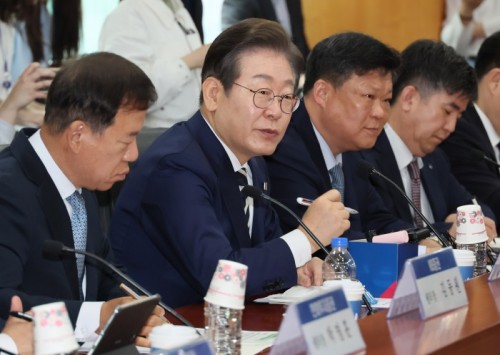 |
| Lee Jae-myung, a presidential primary candidate of the main opposition Democratic Party of Korea, speaks during a policy discussion on revitalizing the capital market at the Korea Financial Investment Association in Yeouido, Seoul, on April 21. / Source: Yonhap News |
South Korea’s main opposition Democratic Party of Korea (DPK) continues to advance legislation perceived as anti-market, even as it publicly champions economic growth. While the party has strategically adopted the language of growth during the presidential race, it has struggled to break away from its longstanding anti-business stance and regulatory inertia. Some within the business and industrial sectors now view the prospect of a DPK administration as a potential crisis, prompting contingency planning.
DPK presidential candidate Lee Jae-myung has emphasized economic growth in recent remarks, and even named his campaign think tank “Growth and Integration.” His policy framework, dubbed “Lee-nomics,” shifts focus away from the party’s traditional emphasis on wealth redistribution, aiming instead to achieve broad-based prosperity. This is seen as an effort to appeal to voters weary of slow growth and economic stagnation.
Despite this rhetoric, the party continues to pursue legislation that critics argue undercuts its pro-growth message. A prominent example is the proposed amendment to the Commercial Act, which faced significant pushback from industry and academia. Though the bill was ultimately voted down in a re-vote in the National Assembly on April 17, the DPK vowed to bring it back, leveraging its parliamentary majority.
Lee has promised a more aggressive version of the bill. At a policy forum hosted by the Korea Financial Investment Association, he called for activating cumulative voting to allow minority shareholders to elect directors, and for gradually expanding the separate election of audit committee members to strengthen oversight. He pledged to pass the revised Commercial Act as quickly as possible.
The amendment would introduce a duty of loyalty to shareholders for corporate directors. While the intent to protect shareholder value is broadly supported, critics warn the legislation could reduce industrial competitiveness. They argue it may deter investment and trigger a wave of lawsuits, exacerbating the “Korea discount” rather than resolving it.
Lee has also advocated for bold investments in cutting-edge technologies, stating that overwhelming technological superiority is key to global leadership. However, he avoided addressing the semiconductor industry’s request for flexibility in the 52-hour workweek, a long-standing concern. The DPK has excluded such provisions from its fast-tracked semiconductor legislation, prioritizing the interests of organized labor, a key support base, over industry demands.
Oh Jung-geun, head of the Korea Finance ICT Convergence Society, said the public needs to recognize that anti-business legislation like the Commercial Act amendment destroys jobs. He urged the DPK to acknowledge the urgent state of the economy and to abandon populist, pro-labor policies in favor of measures that support economic recovery.
Most Read
-
1
-
2
-
3
-
4
-
5
-
6
-
7





















